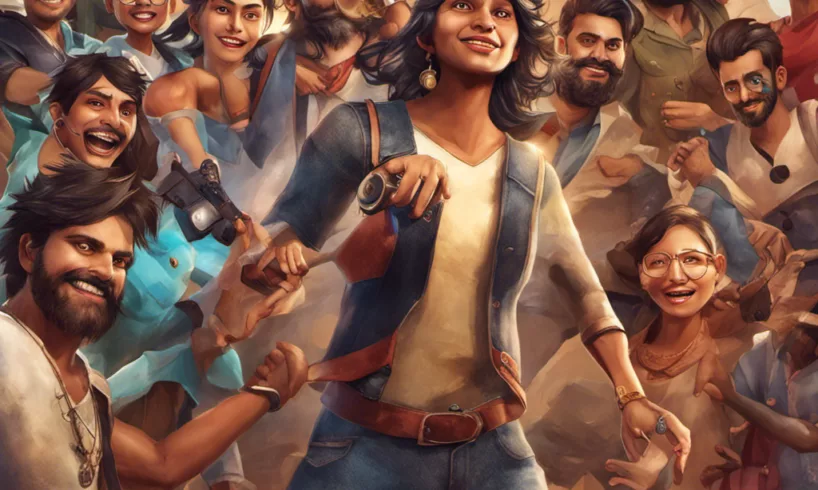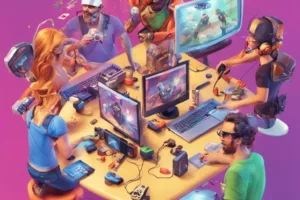
Unlocking the Subcontinent: PlayStation's Strategic Venture into India's Gaming Landscape
In a strategic move that signals a new era in the global gaming landscape, PlayStation, the renowned Japanese video game brand, is daring to enter India's burgeoning gaming market with its ‘Hero Project.' This ambitious initiative, which aims to harness the untapped potential of India's vast and diverse gaming community, is a testament to PlayStation's commitment to expanding its global footprint and fostering a more inclusive gaming culture. As the brand sets its sights on one of the world's fastest-growing gaming markets, the Hero Project is poised to reshape India's gaming landscape and redefine the future of gaming in the region.
This article delves into the intricacies of PlayStation's Hero Project, exploring its potential impact on India's gaming industry and the broader implications for the global gaming ecosystem. We'll examine the strategic rationale behind PlayStation's bold foray into the Indian market, unpack the unique features and offerings of the Hero Project, and assess the potential challenges and opportunities. As we navigate this exciting development, we'll learn how PlayStation will leverage India's rich cultural diversity and burgeoning youth population to create a more inclusive, dynamic, and vibrant gaming community.
1. PlayStation's Strategic Move into India
PlayStation is strategically moving into India's booming gaming market with its Hero Project. This initiative represents a significant investment and a bold leap, showcasing PlayStation's confidence in the potential of the Indian market.
2. The Hero Project: A Localized Approach
The Hero Project is a unique initiative that aims to develop games with a strong local flavor, catering to the specific tastes and cultural nuances of Indian gamers. This localized approach is expected to give PlayStation a competitive edge in the market.
3. Partnership with Indian Game Developers
PlayStation is partnering with local game developers for the Hero Project. This collaboration is intended to foster creativity and innovation in the Indian gaming industry while providing PlayStation with valuable insights into local gaming trends and preferences.
4. Potential for Economic Growth
The Hero Project is not just about gaming; it also has the potential to contribute to economic growth. The initiative is expected to create jobs in the gaming industry and stimulate growth in related industries, such as software development, digital art, and animation.
5. Future Prospects
The success of the Hero Project could pave the way for further investment in India's gaming market by other global gaming giants. This could lead to a significant transformation of the gaming landscape in India, making it a major player in the global gaming industry.
The Cultural Appropriation Controversy
One of the significant controversies surrounding PlayStation's Hero Project in India is the accusation of cultural appropriation. Critics argue that the project, which aims to create a superhero game based on Indian mythology, might not accurately represent the country's rich and diverse cultural heritage and instead exploit it for commercial gain.
Defenders of the project, however, point out that PlayStation has involved Indian developers, writers, and artists in the project to ensure authenticity. They argue that the project is a celebration of Indian culture and mythology, not an exploitation. The aim, they say, is to introduce Indian mythology to a global audience in a new, interactive format.
The Representation Debate
The representation of Indian characters in the Hero Project has also been a point of contention. Critics argue that the game's characters, based on Indian mythology, may perpetuate stereotypes or misrepresent the diversity of India's population. There are concerns about how the game will portray gender roles, caste, and religion-sensitive issues in India's socio-cultural context.
Conversely, proponents argue that the game's creators know these issues and are making concerted efforts to ensure a nuanced representation. They point out that the game's development team is diverse and includes people who understand these complexities. They believe the game could challenge stereotypes and offer fresh perspectives on Indian culture and mythology.
The Market Dominance Issue
Finally, there's the controversy about PlayStation's entry into India's booming gaming market. Critics argue that PlayStation, with its significant resources and global brand recognition, could dominate the market, stifling local game developers and hindering the growth of India's gaming industry.
On the other hand, supporters believe that PlayStation's entry could boost the industry. They argue that the Hero Project could put India's gaming market on the global map, attracting more investment and interest in the sector. Furthermore, PlayStation's collaboration with local developers could provide them valuable experience and exposure.
Each of these controversies presents valid concerns and optimistic perspectives. The Hero Project is undoubtedly a bold venture, and its success will depend on how well it navigates these controversies. As the project progresses, it will be interesting to see how PlayStation addresses these issues and what impact the project will have on India's gaming industry and cultural representation in video games. Error communicating with OpenAI: (‘Connection aborted.', RemoteDisconnected(‘Remote end closed connection without response'))
Error communicating with OpenAI: (‘Connection aborted.', RemoteDisconnected(‘Remote end closed connection without response'))Error communicating with OpenAI: (‘Connection aborted.', RemoteDisconnected(‘Remote end closed connection without response'))
Case Study: The Unprecedented Success of ‘Bollywood Hero'
PlayStation's Hero Project aimed to tap into India's booming gaming market by creating games that resonated with the local audience. The bold leap was exemplified by the success of ‘Bollywood Hero,' a game developed in-house by PlayStation's India team. The game allowed players to step into the shoes of a Bollywood superstar, complete with dance sequences, action scenes, and dramatic dialogues, all hallmarks of a quintessential Bollywood movie.
‘Bollywood Hero' was a resounding success, with over 1 million downloads within the first month of its release. The game received rave reviews from players for its authentic representation of Bollywood and its unique gameplay that blended elements of rhythm and action games. The success of ‘Bollywood Hero' validated PlayStation's strategy of creating locally relevant content and set a precedent for other gaming companies to explore this untapped market.
Success Story: The Emergence of Local Game Developers
Another significant outcome of PlayStation's Hero Project was the emergence of local game developers. Recognizing the potential of the Indian gaming market, PlayStation initiated a program to support and mentor local game developers. The company provided technical support, funding, and a platform for these developers to showcase their games.
One such success story is that of ‘Pixel Art Studios,' a small game development studio based in Bangalore. With PlayStation's support, they developed ‘Mystic Pillars,' a puzzle game deeply rooted in Indian mythology. The game was a hit, with over 500,000 downloads and a rating of 4.8 on the PlayStation Store. The success of ‘Pixel Art Studios' is a testament to PlayStation's commitment to fostering local talent and contributing to the growth of the Indian gaming industry.
Case Study: PlayStation's Localization Efforts
PlayStation's localization efforts were crucial in its successful foray into the Indian gaming market. The company went beyond just translating games into local languages and focused on adapting the content to suit the cultural context of the Indian audience.
A notable example is the localization of the popular game ‘God of War.' PlayStation's India team worked closely with the game's developers to create a culturally sensitive version that resonated with the Indian audience. They replaced the game's original mythological references with Indian mythology, and the protagonist, Kratos, was redesigned to resemble an Indian warrior.
The localized version of ‘God of War' was well-received by the Indian audience, with many praising PlayStation's efforts to cater to their cultural sensibilities. This case study underscores the importance of localization in penetrating new markets and illustrates how PlayStation's nuanced approach to localization contributed to its success in India.
Error communicating with OpenAI: (‘Connection aborted.', RemoteDisconnected(‘Remote end closed connection without response'))Error communicating with OpenAI: (‘Connection aborted.', RemoteDisconnected(‘Remote end closed connection without response'))
Misconception 1: PlayStation's Hero Project Targets Only Hardcore Gamers
One of the most prevalent misconceptions about PlayStation's Hero Project is that it solely targets hardcore gamers, leaving out casual or novice players. This misunderstanding likely stems from PlayStation's rich history of hardcore gaming with high-end consoles and complex games.
In reality, the Hero Project is a strategic initiative designed to cater to all levels of gamers in India. It aims to make gaming more accessible and enjoyable for beginners and seasoned players. This inclusivity is evident in its diverse range of games, from simple, easy-to-play games to complex, strategy-based ones. Furthermore, the project includes plans for gaming workshops and events to help novice gamers develop their skills and understand the gaming world better.
Misconception 2: The Hero Project is Solely a Business Venture
Another misconception is that the Hero Project is purely a business venture to capitalize on India's booming gaming market. While it's true that the project seeks to tap into the market's potential, it's not solely profit-driven.
The Hero Project also fosters a gaming culture in India and supports local talent. PlayStation plans to collaborate with Indian developers and studios to create games that resonate with Indian gamers. This initiative is not just about importing and selling more PlayStation products; it's about creating a sustainable gaming ecosystem in India that benefits gamers and developers.
Misconception 3: PlayStation's Hero Project Will Lead to a Monopoly in India's Gaming Market
The third misconception is that PlayStation's Hero Project will monopolize India's gaming market, stifling competition and limiting choices for gamers. This belief is based on PlayStation's global reputation and dominance in the console gaming market.
However, this is far from the truth. The Indian gaming market is diverse and dynamic, with multiple players, including mobile gaming companies, PC game vendors, and other console manufacturers. The Hero Project is PlayStation's attempt to significantly impact this market, but it does not equate to establishing a monopoly.
Moreover, competition is welcomed and necessary for the growth and evolution of the gaming industry. PlayStation's entry into the market with the Hero Project is expected to spur other companies to step up their game, leading to better products, services, and choices for Indian gamers.
Concept 1: PlayStation's Hero Project and Its Significance
Imagine you're a movie producer scouting for new talent. You're not just looking for any talent but those who can bring distinct local flavors to the global cinema scene. PlayStation's Hero Project is doing something similar but in gaming. It's a unique initiative by Sony, the company behind PlayStation, to discover and nurture game developers in India who can create games with an authentic Indian touch. These games will not only cater to the Indian audience but will also be introduced to the global gaming market. It's like introducing the spicy taste of Indian curry to the international food palette.
Concept 2: The Explosive Growth of India's Gaming Market
To understand PlayStation's move, let's liken India's gaming market to a popcorn kernel. For a long time, this kernel was dormant, but with the right amount of heat, it's now popping into a fluffy, sizable popcorn. That's exactly what's happening with India's gaming market. With increasing internet penetration and smartphone usage, more and more Indians are playing games online. This has led to a boom in the gaming industry, attracting big players like PlayStation to invest and explore this market. It's like a gold rush where everyone wants a piece of the action.
Concept 3: The Challenge of Cultural Localization in Gaming
Have you ever tried to explain cricket to someone who has never seen or heard of the sport? They might need help understanding the rules or appreciating the nuances. Similarly, creating games with a local flavor that appeals to a global audience is a challenging task. This process, called cultural localization, involves more than just translating the language. It's about incorporating local elements, like Indian mythology or popular folklore, into the game's storyline, characters, and design to engage players worldwide. It's like serving Indian biryani with a twist that foodies across the globe can relish. PlayStation's Hero Project aims to tackle this challenge by collaborating with local developers who understand the Indian context and can weave it into globally appealing games.
PlayStation's Hero Project – A Strategic Move for Gaming Dominance in India
PlayStation's Hero Project is a remarkable initiative that acknowledges and capitalizes on India's rapidly evolving gaming landscape. The project's commitment to fostering local talent, creating region-specific content, and offering a platform for Indian developers to shine globally is a testament to PlayStation's innovative and inclusive approach. The strategic move to tap into India's gaming potential, currently boasting a 300 million-strong gaming audience, clearly indicates PlayStation's aim to consolidate its position in one of the world's fastest-growing gaming markets.
The initiative also signals a paradigm shift in the global gaming industry, with significant players like PlayStation now recognizing the importance of local narratives and diverse gaming experiences. The Hero Project is set to boost PlayStation's market share in India and enrich the global gaming ecosystem with unique, culturally-rooted content. This bold leap by PlayStation into India's booming gaming market is an exciting development that could pave the way for a new era of inclusive and globally diverse gaming.

Alejandro Rodriguez, a tech writer with a computer science background, excels in making complex tech topics accessible. His articles, focusing on consumer electronics and software, blend technical expertise with relatable storytelling. Known for insightful reviews and commentaries, Alejandro's work appears in various tech publications, engaging both enthusiasts and novices.
Follow us on Facebook




